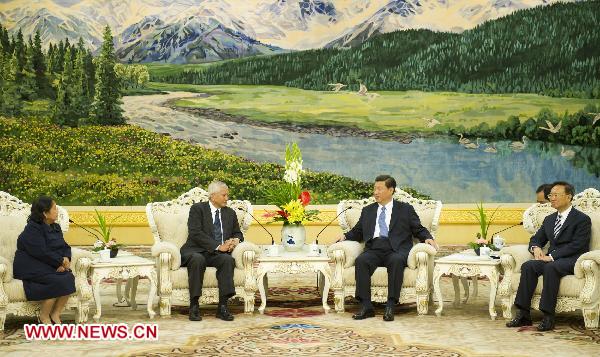China, Philippines to keep peace in South China Sea
 0 Comment(s)
0 Comment(s) Print
Print E-mail
Xinhua, July 8, 2011
E-mail
Xinhua, July 8, 2011
 |
|
Chinese Vice President Xi Jinping (2nd R) meets with Philippine Foreign Affairs Secretary Albert del Rosario (2nd L) in Beijing, capital of China, July 8, 2011. |
China and the Philippines agreed on Friday to safeguard peace and stability in the South China Sea and reduce tensions sparked by maritime territory disputes, just before the Philippine president's upcoming state visit to China.
During talks held on Friday between Foreign Minister Yang Jiechi and his visiting Philippine counterpart Albert del Rosario, the two sides agreed that they would not let maritime disputes affect their broader relations, according to a joint press release.
The South China Sea, an oil- and gas-rich strategic maritime area connecting the Pacific and the Indian Oceans, is partially claimed by several southeast Asian states, including the Philippines. However, China has indisputable sovereignty over the sea's islands and their surrounding waters.
In 2002, China and the Association of Southeast Asian Nations (ASEAN) adopted the Declaration on the Conduct of Parties on the South China Sea, laying a political foundation for future commercial cooperation and long-term peace and stability in the region.
The Philippines, however, recently accused China of making aggressive moves by dispatching increased numbers of maritime patrol ships and science vessels to the region, which China regards as normal and legal.
During Del Rosario's ongoing visit, the two sides "reaffirmed their commitments to respect and abide by" the declaration, the joint press release said.
A senior diplomat from Yang's office also said that the two foreign ministers pledged to "make joint efforts to safeguard peace and stability in the South China Sea" in accordance with the declaration.
"China insists on its road of peaceful development," Vice President Xi Jinping told Del Rosario during their meeting at the Great Hall of the People in downtown Beijing Friday afternoon.
Expanding cooperation conferms with interests
As developing countries, China and the Philippines bear the same task of boosting their economies and improving living standards, which makes economic cooperation a major pillar for bilateral ties.
"China and the Philippines share a long-standing and well-established friendship," Xi told Del Rosario, referring to cooperation in the areas of economics, trade, culture and education since the two sides forged diplomatic ties in 1975.
China and the Philippines "share broad common interests and cooperative prospects," Xi said, adding that enhancing cooperation conforms with the fundamental and long-term interests of both countries.
"China will, under the principles of equality, mutual benefit and common development, further its cooperation with the Philippines in various fields," he said.
China will also work with the Philippines to boost bilateral ties in the spirit of building friendship and partnership with neighboring countries, Xi said.
Del Rosario praised Sino-Philippines relations, saying that the Philippine government attaches great importance to its ties with China.
The Philippines will strengthen high-level exchanges and promote cooperation in various fields with China, he said, referring to the forthcoming state visit to China by President Benigno Aquino III.
The two sides will work together to make the visit a full success, the press release said.
Both sides have agreed to continue to enhance bilateral trade and investment and pledged to cooperate in the areas of agriculture, food safety, infrastructure and transportation.
The two foreign ministers also agreed to enhance cultural and people-to-people exchanges in tourism, education and media cooperation.
They also urged for more collaboration in the fight against transnational crimes, including human trafficking and drug smuggling, the press release said.





